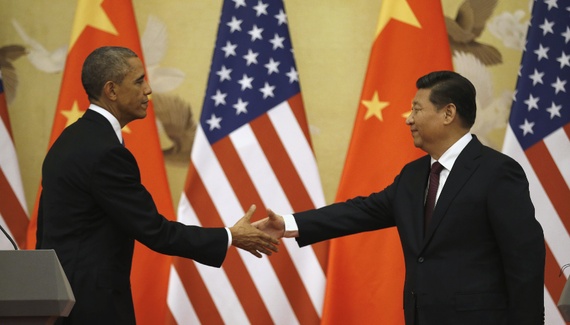The new climate goals that Barack Obama and Xi Jinping announced from Beijing last week met with mixed reactions. While some heralded it as a “game changer,” others claimed it was largely symbolic—simply a bilateral restatement of existing goals. In Washington, the usual congressional suspects promptly issued their battle cries, attacking Obama’s statement as “another sign that the president intends to double down on his job-crushing policies,” and vowing to block related legislation. Newly elected Senate Minority Leader Mitch McConnell claimed that, according to his reading of the agreement, it “requires the Chinese to do nothing at all for 16 years.” At The Conversation, Macquarie University’s John Matthews, the University of Newcastle’s Hao Tan, and Australian National University’s Frank Jotzo take a detailed look at the Chinese efforts that lie between now and 2030—many of which already in the works—to debunk Senator McConnell’s statement:
Far from “doing nothing”, China will be building the world’s largest renewable energy system over the next 16 years. This is something that China has already started doing – so the targets agreed upon are feasible, if arduous.
[…] Mitch McConnell and many other commentators have placed all their emphasis on China’s building of a “black” energy system, comprising new coal and other fossil fuel facilities, while ignoring the enormous commitments already made to renewables and a complementary green energy system.
By our reckoning, the leading edge of change in China’s energy system is already more green than black, and the total system is greening at such a rate that the goals just announced as part of the climate deal should certainly be met.
[…] So far from “doing nothing” over the next 16 years, China is transforming its economy and energy system so that water, wind and solar power will be its driving forces. Other countries – not least close US allies such as Australia and Canada – would be wise to pay attention. [Source]
Click through for charts and additional details on China’s goals.
Writing for CNN, climate scientist Adam Sobel dismisses partisan congressional criticism as “specious and predictable,” and goes on to address two more “substantive” points of critique—that the agreement doesn’t go far enough, and that the agreed upon emissions cuts were part of the plan anyway—noting that neither is enough to disregard the significance of the U.S.-China climate pledges:
The argument here is that the emissions cuts will not be enough to limit the global mean surface temperature increase to 2 degrees Celsius, the benchmark beyond which climate change will be “dangerous,” according to the nonbinding international agreement reached in Copenhagen in 2009. The new U.S.-China agreement alone is indeed very unlikely to keep future warming below 2C.
[…] But we have to take success where we can get it. After decades of failed climate talks — in which the U.S. was often a big part of the reason for failure and China was a big part of our excuse for dragging our feet — this is every bit the political breakthrough it appears to be.
While it’s not enough on its own, the momentum couldn’t be more welcome after so many years of inaction and bad news. […]
[…] The [second] argument here is that Obama had already committed to cuts putting us along the trajectory in the agreement until 2020 (with the EPA regulation of carbon dioxide as a pollutant and the new rules on power plants) and has now just extended the same trajectory to 2025. Similarly, some argue that the Chinese too would be aiming for their targets in the agreement even without it. […] [Source]
At Reason, Steve Chapman notes how this is one instance of China failing to fit the neat narrative of hostile enemy, and hence failing to justify continued U.S. inaction:
The opponents of climate change action had counted on China to give the United States an excuse to do nothing about planetary overheating. Their argument was that it would put a staggering burden on American companies, giving a big advantage to their unconstrained Chinese competitors.
But a couple of underlying assumptions turned out to be faulty. One is that the Chinese put economic growth above everything else. Another is that they are too bent on defying and weakening the U.S. to give in on such a momentous issue.
In reality, the Chinese have come to understand that ever-growing carbon emissions go hand in hand with their deadly air pollution, which causes 670,000 deaths per year—more than the population of Seattle. They also understand that on many issues, cooperation makes more sense than conflict.
[…] The summit illustrated the positive side of this impulse. By embracing international obligations like combating climate change, Beijing makes it harder for Republicans to rationalize despoliation of the planet on behalf of special interests like the U.S. coal industry. It also creates pressure on other major polluters—notably India—to follow suit.
[…] Life and U.S. foreign policy would be simpler if China were as hostile and duplicitous as some Americans assume. But they wouldn’t be easier. [Source]







